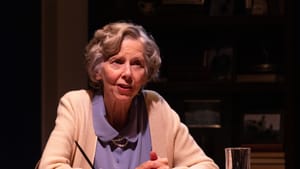Stay in the Loop
BSR publishes on a weekly schedule, with an email newsletter every Wednesday and Thursday morning. There’s no paywall, and subscribing is always free.
Spotlight on the First Lady of the World
Act II Playhouse presents Mark St. Germain’s Eleanor

In 1960, I came face-to-face with Eleanor Roosevelt at the Democratic National Convention in Los Angeles, where I worked delivering coffee and telegrams to delegates. She tapped me on the shoulder and extended her hand, saying, “Hello. I’m Eleanor Roosevelt. Tell me about you.” I wasn’t carrying a camera, but my image of her never dimmed over the years, and came to vibrant life on opening night of Eleanor, the one-woman show now onstage at Act II Playhouse in Ambler.
The regional premiere of Mark St. Germain’s astonishing biographical play is not to be missed. In 90 minutes (sans intermission), star Penelope Reed, who does not resemble Roosevelt, becomes her in voice, walk, dress, and persona.
Separate lives
We meet Roosevelt onstage in a light-filled cemetery in DC’s Rock Creek Park, with her bench, which offered her solitude, center stage. She visits us from her final resting place next to President Franklin D. Roosevelt in Hyde Park, NY, a plot formulation which could seem contrived, yet does not. She draws her audience close to her, sharing that she lies with Franklin more in death than she did in life: “We not only had separate bedrooms, but separate lives.”
The play reveals a wrenching betrayal: while unpacking for Franklin (who is ill), Eleanor is devastated to discover love letters between her husband and Lucy Mercer, her former secretary. This opens old wounds for the famous First Lady, who had a cruel, belittling mother and an alcoholic father who never kept his promises. Eleanor was an orphan by age 10.
Louis Howe, “a newspaper man who loved politics and Franklin because he saw a future in him,” convinces Eleanor not to divorce her husband. Howe warns that divorce would end Franklin’s political life and result in the loss of two essential public gifts: Franklin’s head and Eleanor’s heart.
Eleanor tells Franklin that she will remain married with three stipulations: they would take separate bedrooms, she would have an independent life, and he would never see Mercer again (a promise he doesn’t keep). We learn of Franklin’s other lovers, and two of Eleanor’s own: an appealing bodyguard and, of more consequence, her “dear friend” journalist Lorena Hickok who leaves her because Eleanor cannot allow sustained intimacy.
Eleanor and Franklin fell in love, but Eleanor was no match for her overpowering mother-in-law and consistent rival, Sara Delano Roosevelt, who opposed the marriage and afforded the couple no privacy as Franklin withdrew into his ambition. Overwhelmed with one pregnancy after another in the early years of her marriage, Eleanor was unable to bond with her children or enjoy her own sexuality—until years later, and not with her husband. But there is also no doubt that Eleanor remained devoted to her husband, even through the ravages of polio.
A marriage for dire times
Eleanor offers a portrait of events leading to World War II and its aftermath. Eleanor argues with her husband constantly and forcefully. Their intense arguments replace sex as their marital juice. She fiercely opposes her husband’s support of internment camps for Japanese Americans, his refusal to admit German Jewish children as refugees, and his failure to insist on anti-lynching legislation, or address racism in the military.
Through Eleanor’s words we understand that Franklin deeply valued his wife’s moral direction, but held his own to protect essential legislation. Unlike some leaders today, his goals were never to promote discord or glorify himself, but instead to help as many people as realistically possible in a divided country during dire times.
We are our choices
Director Kate Brennan brings Eleanor’s story to life truthfully, along with sound designer John Stovicek, a superb set by Parris Bradley, and costume design by Janus Stefanowicz, who helps transform Reed into a woman she does not otherwise resemble. Projections by Adam Danoff give us some of Eleanor’s reflections to ponder in print. As the titular first lady, Reed nails not only Eleanor’s voice, but the voices of her mother and mother-in-law, her daughter Anna, Winston Churchill, and Franklin himself.
My only disappointment in Eleanor is a wish for deeper examination in the script of her turmoil and confusion. She tells us she cannot rest, that her spirit is not with her husband, that she does not understand him or herself; she doubts her choices in life and feels like a stranger to herself. She says she can’t rest until she knows why she can forgive her father (seen from childhood as her deepest love) for his betrayals, but not her husband. The truth is that Eleanor loved Franklin with more intensity than she could know, and her anger at him was her shield against another devastation. Her father was not her deepest love. It was always Franklin.
St. Germain gives Eleanor peace in this conclusion: we are the choices we make. She owns what she was able to contribute through her public life (where she was safe), continuing the famous couple’s work for 17 years beyond her husband’s death. She concludes that she and Franklin formed a “partnership of doing great things that we could never do alone.” Eleanor’s final words, and the play’s culmination, will never leave you.
What, When, Where
Eleanor. By Mark St. Germain, directed by Kate Brennan. $37-$49. Through November 20, 2022, at Act II Playhouse, 56 East Butler Avenue, Ambler. (215) 654-0200 or act2.org.
Masks are not required in the theater.
Accessibility
Act II is a wheelchair-accessible venue through a side door; call the box office for assistance in entering.
Sign up for our newsletter
All of the week's new articles, all in one place. Sign up for the free weekly BSR newsletters, and don't miss a conversation.

 SaraKay Smullens
SaraKay Smullens